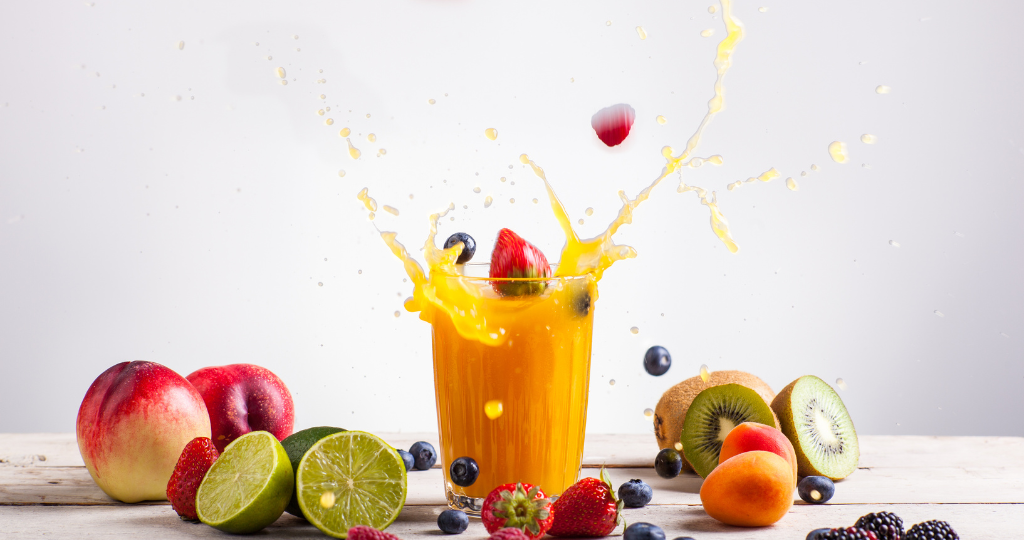
4 Best Juices For Digestion : Steps to Make them at Home
A lot of people experience tummy troubles like indigestion and acid reflux. Did you know that natural remedies like fruit and vegetable juices can help? In this article, we'll talk about the best juice options that can aid digestion, the science behind how they work, and how you can easily add them to your daily routine. Keep reading to learn how you can feel better and soothe common digestive problems with a refreshing glass of juice!
Why it is Important to keep Your Digestive System Healthy?
The process of digestion is a complex one that involves breaking down the food we eat into smaller, more manageable components and nutrients that your body can absorb. The nutrients are then used to provide energy, promote growth, and aid in the repair of your body. This process requires the coordinated effort of several organs, including the mouth, oesophagus, stomach, small intestine, large intestine, and rectum.
When digestion is working properly, you feel great. You have plenty of energy, your bowel movements are regular, and you don't experience any discomfort. But when digestion is off, it can lead to a whole host of issues, including:
1. Acid Indigestion
One of the most prevalent issues is acute indigestion, which around half of adults experience every year. Characterised by unpleasant burning sensations in the upper abdomen, episodes tend to last up to a few hours. Causes range from tomato sauce-heavy meals to greasy, spicy foods that irritate the digestive tract. Stress can also trigger acid indigestion.
2. Abdominal Bloating
That uncomfortable "overfull" feeling of a distended, tight belly affects up to 30% of people regularly, disrupting both digestion and confidence! Contributing factors include gas-producing foods, eating too quickly, anxiety, food intolerances, constipation and more. Thankfully, there are natural ways to ease the misery.
3. Infrequent Bowel Movements
Marked by difficulty passing stools, constipation results from factors like poor fibre intake, inadequate hydration, sedentary living and side effects of some medications. Left unchecked, it can spawn abdominal pain, bloating and appetite disruption. Gentle cures are preferred over laxatives long-term.
4. Acid Reflux Disorder
When stomach acid flows back into the delicate oesophagus, it irritates the lining to cause a burning chest and throat discomfort, informally called acid reflux. Caused by anatomical issues like hiatal hernias or behavioural influences like obesity, the chronic version is gastroesophageal reflux disease (GERD), requiring long-term management.
Common Causes of Digestive Issues
Several factors can contribute to digestive problems, such as:
- Poor diet: Consuming a high diet of processed foods, sugar, and unhealthy fats can be challenging for the digestive system, leading to inflammation and other complications.
- Lack of fibre: Fiber is crucial in maintaining a healthy digestive system, as it aids in regulating bowel movements and promoting the smooth functioning of the digestive tract.
- Dehydration: Insufficient water intake can cause the digestive system to become sluggish and lead to constipation.
- Stress: Psychological stress can disrupt the balance of beneficial gut bacteria and cause inflammation, leading to digestive health problems.
- Medications: Certain medications can cause digestive issues by altering the gut microbiome, such as antibiotics and non-steroidal anti-inflammatory drugs.
Benefits of Digestive Juices

Juice can be a powerful tool in promoting digestive health. First and foremost, they provide essential hydration, which is necessary for preventing constipation and keeping the digestive system functioning optimally. Additionally, certain juices contain specific nutrients and enzymes that can support digestion by breaking down food more efficiently and reducing the workload on the digestive system.
Some juices are rich in fibre, which regulates bowel movements, and others have anti-inflammatory properties that reduce inflammation in the gut and relieve the digestive tract.
The soothing Science Behind juices for Better Digestion
With careful ingredient selection and preparation, various juices offer science-backed mechanisms to ease digestive discomforts gently:
List of Best Juice For Digestion
Aloe Vera Juice Soothes Gastric Inflammation

This popular house plant yields a slick gel full of enzymatic and antioxidant compounds that may tame gastrointestinal inflammation, ulcers and acid reflux. Some evidence also suggests aloe improves irregular bowel movements. Its cooling and protective qualities likely explain historical use against gut troubles.
How you can make Aloe Vera Juice at Home?
- Step 1: Cut the Aloe Vera plant and remove its skin.
- Step 2: Rinse it under water to remove all the laxative substances.
- Step 3: Blend the Aloe Vera with water until it becomes smooth.
- Step 4: Strain the mixture for a smoother texture, pour it into a glass, and it's ready to be consumed.
Ginger and lemon juice Relieves Indigestion

A zingy blend of ginger and lemon can counter indigestion beautifully, thanks to their combined effects. Gingerols within ginger may boost digestion and calm inflammation, much like non-steroidal anti-inflammatories. Meanwhile, the acidity of vitamin C-rich lemons helps balance stomach ph levels when disrupted. This tag team works synergistically against the nausea, bloating and warmth of indigestion.
How to make ginger and lemon juice at home?
- Step 1: Wash and peel 1 medium-sized ginger root (about 2-3 inches).
- Step 2: Chop the ginger into smaller pieces.
- Step 3: Add the chopped ginger into a blender with at least 2 cups of water.
- Step 4: Strain the juice.
- Step 5: Squeeze 2-3 lemons into the ginger juice and mix.
- Step 6: If you want to enhance the taste, you can add 1 to 2 spoons of honey.
Note: Issues like indigestion and insulin resistance can cause the risk of diabetes, therefore we introduce you to our 100% Ayurvedic juice for diabetes.
Pineapple Juice Boosts Protein Digestion

Bromelain is the headlining enzyme within sweet pineapple juice, adept at breaking down protein chains into absorbable amino acid components. This not only aids general protein digestion, but research reveals it specifically relieves gastric troubles like bloating, gas and IBS following meat meals. It even shows promise in countering heartburn symptoms by protecting stomach lining from damaging acids.
How to make Pineapple Juice at Home?
- Step 1: Peel and chop the pineapple into small chunks.
- Step 2: Blend the pineapple chunks with water in a grinder.
- Step 3: Strain the juice into a glass for a smooth texture.
- Step 4: To enhance its taste, add a pinch of black salt.
Papaya Juice Eases Constipation

Tropical papaya similarly harbours a special protein-digesting enzyme called papain that lends its name. Beyond aiding general food breakdown required for regularity, evidence suggests papaya's fibre, antioxidants, and micronutrients collectively stimulate healthy bowel function while controlling flatulence-provoking bacteria. The seeds specifically pack an extra digestive punch.
Many other juices, like tart cherry and pomegranate for inflammation or fennel and celery for bloating also show real promise. Now, folks know both the science and traditional wisdom behind juices for better digestion.
How to make Papaya Juice at Home?
- Step 1: Cut the papaya in half and scoop out all the seeds before peeling and chopping it.
- Step 2: Blend it with water using a grinder.
- Step 3: For a smoother texture, strain the juice.
- Step 4: If you like, you can add black salt and lime juice to enhance its taste.
Incorporating Digestive Juices into the Diet
Actionable ways to naturally incorporate digestive care juice. Here are some ideas to infuse these gut-friendly beverages into your regular regimen:
Wake up with aloe or ginger juice
Rise and shine digestion by starting mornings right with fresh aloe vera or a ginger/lemon shot. This vibrant first drink prioritises self-care from dawn through daylight. To boost hydration and mineral content, dilute with warm mineral water.
Snack on bite-sized papaya pieces

Skip the vending machine and graze on a plastic container filled with fresh papaya chunks and pineapple pieces. Doing so feeds cravings with tropical enzymes galore, supporting healthy digestion instead of hindering it with junk food.
Take post-meal pineapple enzyme breaks
When that overly indulgent lasagna or protein-piled barbecue dinner calls, lean on pineapple juice to support digestion afterwards. A small glass 30-60 minutes following meaty meals gives bromelain enzymes time to get mechanically breaking down those mammoth protein chains.
Sip therapeutic peppermint tea
The aromatic oil within peppermint tea boasts antispasmodic effects to relax digestive muscles clenched by anxiety or dinner distress. Replace coffee rounds with soothing peppermint brews to promote digestion and overall tranquillity. Gratefully stomach settled with satisfaction.
Rely on the rainbow for variety
It is advisable to stick to more than one kind of juice every day to avoid getting bored of the flavour. Instead, try different fresh juices made from papaya, pineapple, carrot and apple. By varying the colours of the fruits and vegetables you consume, you will get a wide range of micronutrients and enzymes that will help maintain a healthy balance in your gut.
People can soothe minor stomach issues by consuming aloe, snacking on juicy papaya, or sipping pineapple juice 30 minutes after a meal. However, those who are experiencing persistent problems should consult a gastroenterologist to address the underlying causes. In the meantime, it doesn't hurt to try these simple home remedies to alleviate digestive discomfort and put a smile on your face.
Also, check:
Additional Tips for Supporting Digestive Health
In addition to incorporating digestive juices into the diet, several other strategies can help support digestive health:
- Stay hydrated: It is important to drink enough water throughout the day to maintain a healthy digestive system and prevent constipation.
- Eat mindfully: Take time to eat meals slowly and chew food thoroughly. This helps the digestive system break down food more efficiently and can prevent overeating.
- Manage stress: Stress can have a negative impact on digestion, so finding ways to manage stress through activities like meditation, yoga, or deep breathing exercises can be beneficial.
- Exercise regularly: Making physical activity a regular part of your routine can aid in stimulating the digestive system and encouraging consistent bowel movements.
- Prioritise sleep: Lack of sleep can interfere with digestion, so it is important to get a quality sleep every night of 7-9 hours to maintain digestive health.
Managing Ongoing Digestive Problems

While incorporating digestive juices and making lifestyle changes can be helpful for supporting digestive health, it is crucial to consult with a healthcare professional if persistent or severe digestive issues arise. Some digestive problems may be indicative of underlying health conditions that require medical attention and treatment.
A healthcare provider can help in identify any potential underlying causes of digestive issues and develop a personalised treatment plan to address individual needs and concerns. This may include dietary modifications, medication, or other targeted interventions.
In addition to these juices you can also check out our range of ayurvedic supplements for digestive health.
Conclusion
Fruit and vegetable juices can be a natural remedy for digestive wellness. Pineapple and papaya juices provide digestive enzymes, while peppermint and ginger teas relax tracts. Aloe vera juice protects stomach linings. These juices offer both short-term relief and long-term nutritional benefits. Incorporating these juices into your diet can help relieve mild digestive issues. However, those with chronic conditions should stick to physician-approved treatment plans.









Leave a comment
This site is protected by hCaptcha and the hCaptcha Privacy Policy and Terms of Service apply.